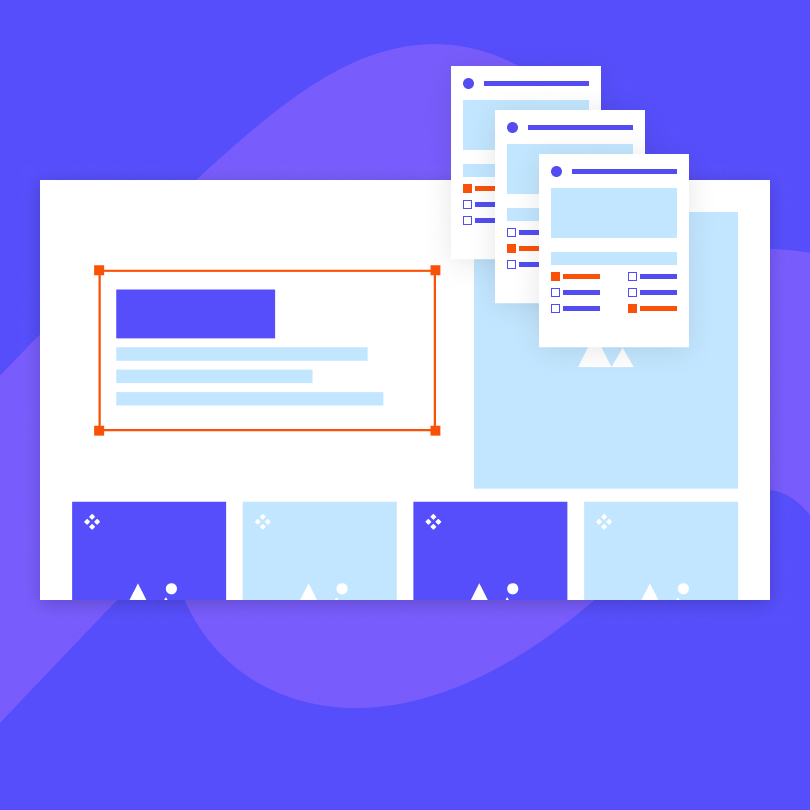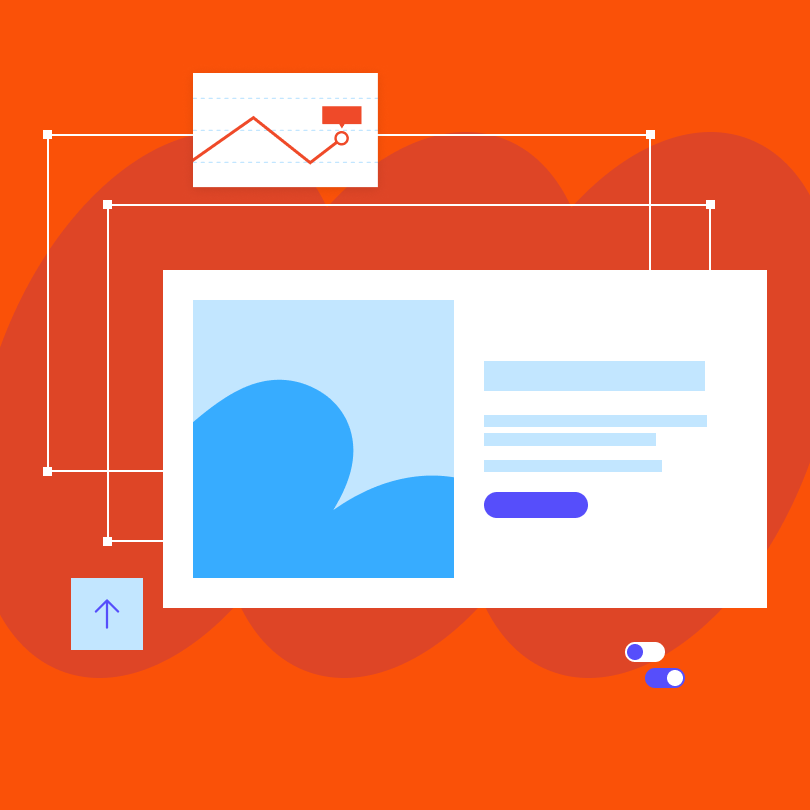Does every business need an effective online presence? Undoubtedly, yes. Without one, people seeking your services or products may never discover your company.
Does every business need a website? In most cases, yes. A quality site increases credibility and visibility while signaling that your company embraces digital tools and platforms.
Does every business need custom web development? The answer depends on your company’s size, industry, goals, budget, and the website’s complexity.
Before choosing the path of templates, you must understand the characteristics and advantages of custom website development. Packed with this knowledge, you’ll make more informed decisions and choose the best option for your business.
This guide covers everything you need to know about custom web development, ensuring you leave with no unanswered questions or doubts.
What is Custom Website Development?
Custom web development builds a website entirely from scratch to match your business’s unique needs and goals. Unlike pre-made templates or one-size-fits-all solutions, custom website development creates a site where every feature, function, and design choice is original.
Keep in mind that it’s more than aesthetics. This method builds high-performance assets that drive user engagement, adapt to advanced eCommerce requirements, and ensure top-notch speed and functionality across devices.
In a nutshell, what is custom website development? It’s the strategic approach to ensuring your site’s digital infrastructure aligns with your business vision.
However, don’t confuse custom with customized web development. Custom development builds a site entirely from the ground up, while customized development modifies an existing template to fit specific needs.
Moreover, custom focuses on precision and uniqueness, vital for businesses needing a one-of-a-kind presence rather than tweaks to a standard layout.
The Difference Between Custom Web Development and Website Templates
Custom web development and website templates offer distinct routes for creating a website, each with unique flexibility, control, and cost implications. It’s much like building a custom home, where architects and designers create carefully every detail to meet your exact needs.
In this approach, developers tailor the design, functionality, and UX to match your brand and business goals to a T. This enables the inclusion of highly specific features, integration of complex systems, and scalability as your business evolves.
In contrast, a website template resembles a ready-made home, with a pre-determined layout, design, and structure. Templates work well for businesses needing a quick launch on a limited budget. While offering preset designs and customization to some extent, templates often lack flexibility. These limitations become apparent when adapting to complex needs.
For websites requiring advanced eCommerce functions, interactive components, or a tailored user flow, templates may fall short. Designed for general-purpose usage, they can dilute a brand’s identity online.
Custom web development, while more resource-intensive, breaks these restrictions. It delivers optimal performance, tailored security measures, and an exceptional UX that keeps audiences engaged. However, it often involves a higher investment in both time and money, as every element is built from scratch.
WordPress Website vs. Custom Web Development
The difference between a WordPress website and custom web development is that the former has a fast setup, pre-designed themes, and countless plugins. This makes it great for rapid launches and those without extensive coding skills.
However, this flexibility has its downsides. Customization often stops where the template ends, and plugins can clash. Keep in mind that this can affect performance.
On the flip side, custom web development is a solution that delivers exact specifications and scalability. It’s a longer, pricier process but yields a unique website without third-party code bottlenecks.
Although maintenance requires narrow expertise, you can easily optimize it for specific goals, from performance to branding.
How Does Custom Web Development Work from Concept to Launch
Custom web development transforms a raw idea into a fully functional website through the following, interconnected phases.
Ideation
At the very beginning, stakeholders have to define goals and target audiences, as well as key features. The task of developers and designers is to translate this into a detailed project brief and set the stage for strategic decisions.
Wireframing and Prototyping
This phase aims to uncover potential bottlenecks and make the project as smooth as possible. Every click, swipe, or scroll must pass a strict evaluation to ensure a good UX.
On the other hand, developers simultaneously plan the technical framework, including choosing programming languages, CMS platforms, or custom code based on scalability and performance needs.
Design
During this phase, creativity meets precision. UX and UI designers must create interfaces that reflect brand identity and ensure aesthetics fulfill usability. Each pixel should match user behavior insights, so that form and function work in harmony.
Development
The development stage is where all the coding magic unfolds. Front-end developers are in charge of handling the visuals and interactions users engage with, while back-end specialists tackle robust data handling, integrations, and security.
Moreover, APIs link external tools to the core infrastructure to enable automation or advanced functionalities.
Quality assurance (QA)
The custom web development process requires relentless scrutiny. This is why testers simulate real-world conditions to identify bugs, compatibility issues, or performance lags.
Optimization at this stage has to ensure that the site loads faster and adapts across devices while complying with web standards.
Launch
You don’t get a custom solution by simply flipping a switch, as this is an orchestrated rollout. Devs migrate the site to live servers, configure domains, and fine-tune settings for public access. Meanwhile, teams have to monitor analytics from day one, ready to tweak based on user feedback.
Which Businesses Need Custom Web Development
Custom web development is typically necessary for businesses with specific objectives, complex functionalities, or ambitious growth plans. Enterprises in tech, eCommerce, or finance are the most likely to demand tailored platforms that will help them handle intricate operations or scale rapidly.
However, small businesses targeting niche markets can also benefit, especially when standard templates don’t have what it takes to capture their brand’s essence. Companies with larger budgets prioritize custom solutions to ensure full control over integrations, UX, and security.
Startups may need scalability or innovative features that tend to be limited on off-the-shelf platforms. Ultimately, any organization hoping to achieve a standout digital presence or solve industry-specific challenges should choose custom development.
Benefits of Custom Web Development
The following are the main advantages of custom web development.
1. Better UX
With custom website development, you can match every element of your site to user behavior for optimal results, such as smooth navigation. While templates impose often generic layouts, custom solutions adapt to your audience’s preferences and create intuitive designs, resulting in less friction and higher satisfaction.
Moreover, this method relies on precise coding, which means faster load times that prevent users from bouncing off sluggish pages. Custom web development includes integrated, user-friendly features like personalized dashboards or predictive search, simplifying complex tasks and making visitors feel in control.
- Adaptability: This solution allows responsive designs that can adjust across devices and cater to users everywhere.
- Consistency: With unified aesthetics and functionality comes greater trust, which subtly guides users through your brand’s story.
- Flexibility: As frameworks are tailored to your needs, they allow easy integration of new tools and features, ensuring your site stays relevant.
Another defining characteristic of custom website development is its ability to perform real-time optimizations based on analytics, improving touchpoints as they’re discovered. Every choice, from button placement to micro-interactions, has a role in reflecting data-driven insights and making sure UX isn’t just better but strategic.
2. Greater Branding
Fifty-five percent of a brand’s first impressions are visual, which is why you shouldn’t confine your digital identity to templates. Avoid ending up with a website that doesn’t ooze your branding characteristics by working with professionals who will design bespoke layouts and interactive features that can amplify recognition and trust.
Aim for customization that highlights your brand’s voice and creates a cohesive experience, from typography to microanimation. Every pixel should work to differentiate your business in an overly crowded market.
Unlike cookie-cutter solutions, custom web development is the route to a neat integration with specific marketing goals and user behavior, enabling:
- Precise storytelling through visuals and structure.
- Consistent brand messaging across platforms.
- Adaptability for future branding shifts or innovations.
Subtle details, like a logo’s placement or the tone of CTA buttons, reinforce brand identity without shouting. After all, custom development shouldn’t just reflect who you are, but also define how users perceive and remember you. When operating in a world of sameness, you have to be original in order to survive.
3. Improved Rankings
Fast load times are the predisposition of good rankings, as every delay can push your visitors away. For instance, the probability of a mobile site visitor bouncing increases by 123 percent when a page load time goes from one second to ten seconds.
The good news is that custom websites are faster, which search engines appreciate. Clean, streamlined code eliminates crawl errors and helps all pages be indexed efficiently.
While vital for visitors, intuitive site structures are also helpful for search algorithms, as they signal relevance.
In custom website development, you can count on devs to refine metadata, schema markup, and keyword placement without battling template constraints. This precise control will increase visibility for targeted queries.
Moreover, responsive design allows cross-platform optimization and meets Google’s mobile-first indexing requirements, resulting in higher rankings. In return, this helps you position your brand as an adaptable and algorithm-savvy leader.
4. Allows More Complexity and Uniqueness
Although they have certain benefits, off-the-shelf templates impose limits. However, custom solutions eliminate them.
In this approach, every feature can correspond to specific issues and needs, whether integrating complex APIs or creating unique user journeys. Thanks to this flexibility, you can align your website and your brand’s identity and ensure users remember your site for more than its colors.
Custom web development also optimizes performance for specialized goals. No matter if you need a dynamic product configurator or real-time analytics dashboard, it’s all achievable without the bloat of generic tools.
5. Higher Scalability
Pre-built platforms often struggle with expanding functionalities or managing higher traffic, but custom-built systems can keep pace and evolve with your business. Custom scalable architecture is enough to maintain smooth performance during peak demands without compromising speed or security.
Without every component matching your goals, you may have a hard time integrating new features, APIs, or technologies once your operations and teams start expanding. Moreover, custom systems are made to avoid unnecessary bloatware and stay cost-effective.
6. Increased Automation
According to Think with Google, using AI and machine learning is among the main strategies for businesses to obtain or sustain a competitive edge. Pre-built solutions are not the best option if you want to enjoy the benefits of automation, as they often hit the ceiling.
However, custom website development can help you break barriers by integrating perfectly with your unique processes and eliminating inefficiencies. They sync with existing tools like CRM, inventory management, or payment gateways to create a unified platform that works smarter, not harder.
As a result, you can reduce human errors in, for example, data handling or scheduling. Imagine a system that invoices clients, updates inventory, and sends status updates simultaneously.
With fewer manual interventions, you can save time and redirect resources to innovation and growth.
Custom builds also adapt as your needs evolve, scaling without sacrificing functionality. This leads to:
- Dynamic workflows that automatically assign tasks based on project updates.
- Smart notifications in the form of targeted alerts without user input.
- Streamlined reporting that generates detailed analytics with a click.
7. More Secure
You need a reliable solution to eliminate vulnerabilities common in off-the-shelf platforms. Professionals who provide custom web development services can help you write tailored code and reduce exposure to generic exploits.
This approach allows stricter control over user authentication and data encryption. Regular updates target emerging threats directly, unlike standardized patches that prioritize broader compatibility over precision.
Thanks to integration with advanced monitoring tools, you can detect anomalies early and prevent breaches. Custom development also minimizes your reliance on third-party plugins, notorious for security loopholes.
Final Thoughts
Although custom web development may take longer and require more resources, it allows your brand to stand out and meets your specific goals. If you have a reliable team that can tailor the solution to match your vision, you’ll get a reliable solution that can rake in profits that one-size-fits-all platforms can’t.





